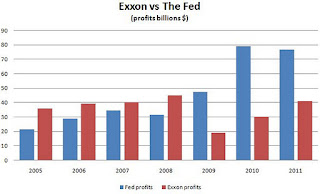I am not against charity. I think when it comes to charity most regular people have good intentions. But when I see charity turn into star-studded gala events that are reported as the hottest “ticket” in town, like the annual Robin Hood Foundation Ball, then I think it’s all one big vanity show.
It’s the elite wanting cleanse their consciences in a very ostentatious and very phony display of “compassion” for the less fortunate, even though I am sure that 99.9% of the attendees, if you asked them, would be pro-austerity, pro-entitlement reform, pro-deregulation, union bashing, anti-minimum wage ideologues.
In fact, I know it.
I’ve read statements by Paul Tudor Jones, the billionaire hedge fund trader who is also the founder of the Robin Hood Foundation. Here's one of his quotes on America's debt:
| "We borrowed against the future, and soon we will have to pay." |
Or what about another billionaire hedge fund guy, Stanley Druckenmiller, who is also very much a part of the charity elite and a big contributor to the Robin Hood Foundation. He's been going around screaming that we have an "entitlement problem."
These plutocrats may contribute to charity, but their overriding ideology is the usual out of paradigm stuff that is so much a part of the austerity push, which is literally impoverishing people.
So it’s really a very self centered vanity thing that they're doing. Yes, they’re raising money for the poor and the underprivileged, which is nice; however, it is their beliefs and more importantly, their inordinate influence on policy as a result of their money and status that keep the poor and underprivileged, well, poor and underprivileged. It’s almost like they want the downtrodden to stay down just so they can have their galas showing everyone how wonderful and generous they are.
The other type of charity that I am against, which is just as disingenuous and self-serving is corporate charity. For me, the best corporate charity you can have is just for corporations to pay their workers well. That’s all the “charity” they need; simply a decent paycheck, a living wage. I’m not talking about top executives either, who are routinely showered with lavish paychecks, but about all the workers right down to the guy stocking the shelves or, sweeping the restrooms.
Low wages have become a corporate ethos. It’s one thing to say, “That’s the only way we can make money,” which is what Wal-Mart founder, Sam Walton famously said:
| "I pay low wages. I can take advantage of that. We're going to be successful, but the basis is a very low-wage, low-benefit model of employment." -Sam Walton |
However, it's another thing when corporate profits go up, up and up, relentlessly, as they have been, while worker pay has been going the other direction: down, down, down. It’s not even as if worker pay just stayed steady, it’s been falling. Look at the chart below.
Corporate profits vs labor share

That is corporate profits against the share that labor gets. This means that all the gains in productivity have gone to firms and none of that has gone to workers. That means all the money has gone to the firms and nothing to the workers. In fact, workers have had their pay reduced.
A system like this can only exist where there is crushing, vice-grip control over economic policies affecting taxation, labor, income, trade, investment, etc. It's literally an industrial dictatorship. That's exactly what we have. It benefits large corporations and the plutocrats that control them. Nobody else.
So feel free to scoff at their phony and vane displays of charity.




